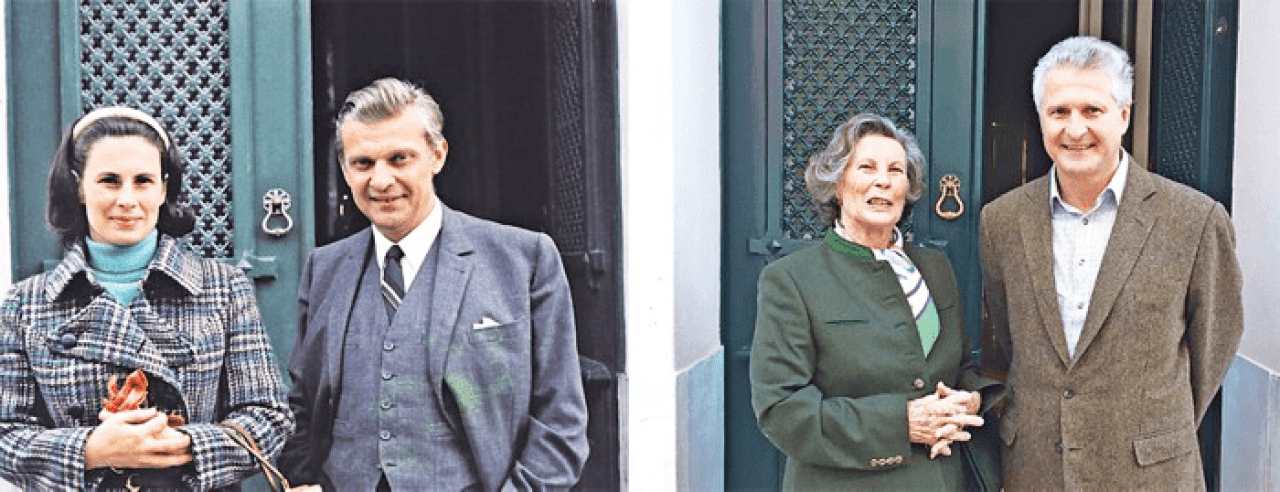Press Room
How Hovione grew from a basement lab to a global pharmaceutical services company
C&EN, November 12, 2018

Diane Villax poses in 1962 with her husband, Ivan (left), and this year with her son, Guy, in front of the house, Guy’s current home, where she and Ivan launched Hovione in 1959.
Diane Villax, Hovione’s still-active matriarch, recounts the rise of the pioneering firm
He started, the poor chap, at the age of 23,” recalls Diane Villax of her son Guy’s debut in 1984 at Hovione, the family’s pharmaceutical chemical business. “He was thrown to the lions in the Far East. To China. He was told by his father, ‘Build me a factory in Macau. Get me some land, talk to the authorities, and build me a factory.”
This he did, she says. “He built it in 14 months, ran it for six months, and asked for an FDA inspection.”
Still marveling at the audacity of the project, Diane recounts the many roadblocks to building a factory in Macau, a former Portuguese colony, now a Las Vegas-like gaming resort, where no construction engineers were up to the project in 1984. Shipping construction materials, glass-lined tanks, and other apparatuses from Italy, Greece, and the company’s home base of Lisbon was another daunting challenge, given that the only suitable cargo port was in Rotterdam, the Netherlands.
Her daughter, Sofia, was also deployed to China, in charge of quality control at the new plant. Diane remembers Sofia calling home rattled after an interview with an inspector who brusquely dismissed the upstart plant’s chances of passing a U.S. Food & Drug Administration audit. “Poor child,” she says. “Well, they had the inspection, and it was fine, so then they all celebrated.”
Over a Saturday lunch of boiled prawns and salad on the patio of her home in a Lisbon suburb, Diane shares several other anecdotes of how she and her husband, the chemist Ivan Villax, started a company in their basement, developing fermentation processes for the manufacture of antibiotics. It has evolved over 59 years to become a major supplier of drug ingredients and associated services, with factories on three continents.
Ivan died in 2003, but at 83 Diane remains active with Hovione. She is a board member, having stepped down as chair only two years ago. Guy and Sofia are also on the board, along with four outside nonexecutive directors, including the current chair. Passing the chair to an outsider, Diane says, seemed like the thing to do now that the company has achieved a critical mass.
Born in Portugal but raised in England—her mother Portuguese, her father British—Diane Du Boulay met Ivan, a Hungarian chemist displaced by the Russian invasion after World War II, in 1956. Both their families had moved to Lisbon. Ivan came from France, where he studied microbiology, developing chemistry for penicillin, tetracycline, and other antibiotics in his spare time.
“I think he got his first patent in 1955,” Diane recalls. “He was enjoying life in Lisbon. A young man about town and a scientist and a bit of a magician at dinner parties. He was very much in demand.”
The two married and started the company with two partners, both of whom left shortly thereafter. Diane and Ivan began by selling antibiotics and other generic drugs, achieving their first big success selling betamethasone in Japan. They built a manufacturing plant on land his family owned outside Lisbon in Loures.
“Ivan was obviously the inventor, the producer, and the salesman,” she says. “Somebody had to look after the back office, issue invoices, talk to the banks, and get some money. So that was me. For 35 years, nobody signed a check except for me. I was in charge of all the imports and exports and all the licenses.”
The focus remained on generics, Diane says, until Guy came back from an InformEx exposition in the U.S. in 1993, enthusiastic about exclusive synthesis of active pharmaceutical ingredients (APIs). They got a call from Bristol-Myers Squibb shortly thereafter with a request to make an API, found a chemical engineer willing to take on the complicated chemistry, and never turned back.
Nor has Diane disengaged from oversight of the company’s business, which in one famous instance involved direct engagement with a chemical.
Early on, with Ivan on the road, Diane was awakened one night by a chemical smell in the house. She called an engineer who worked for the company, and the two identified a leaking vessel in the basement. They found an empty container. Preparing to transfer the contents of the vessel, Diane realized that someone would have to suck on the hose to get the liquid moving. The engineer demurred, noting that they had no idea what was leaking.
“I had to do it,” she says. “Somebody had to get it going.” The operation was a success, and Diane soon learned that the solvent was ethyl acetate. “My husband was rather horrified when he learned of this.”
Diane Villax was awarded Portugal’s Scientific Merit Medal at the opening of Science 2017, a science and technology meeting in Lisbon. The medal is given in recognition of contributions to the development of science and scientific culture in Portugal.
Read the article at C&EN online

